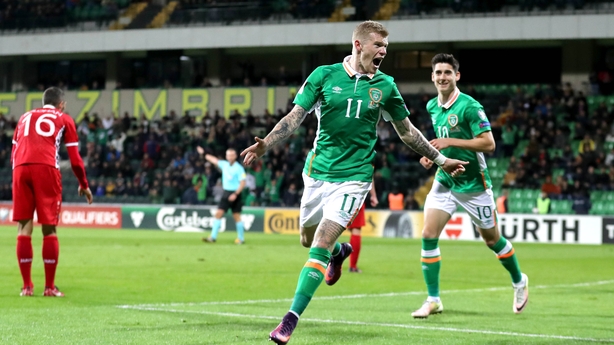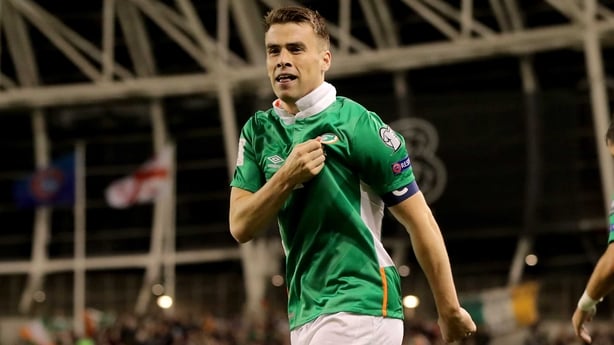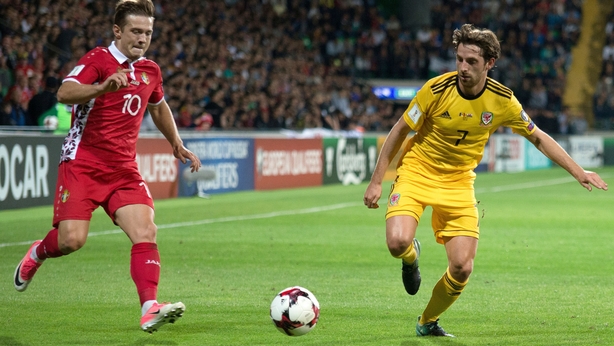Ireland defender Cyrus Christie believes that tomorrow night’s World Cup qualifier against Moldova is going to be a game of patience, with the visitors likely to come to Dublin to put 11 men behind the ball.
"They are going to sit off and put everyone behind the ball and people don’t realise how tough that is to break down. So it is going to be a game of patience," said Christie at Wednesday’s press conference.
But while the Middlesbrough full-back is toeing the party line with talk of caution and contentment with winning the game in the 90th minute, Ireland’s last two disappointing results might suggest that the fans may not be blessed with that patience emotion.
A likely sell-out at the Lansdowne Road venue shows that the appetite and belief remains with the Ireland faithful, however, they will settle for nothing less than a gung-ho approach to the game against the bottom team in the group, who have only managed to secure two points from their eight games thus far.
The doom and gloom of the defeat to Serbia was made more palatable by the enthusiasm and efforts of the Irish team on the pitch, and the Green Army will expect Martin O’Neill’s side to pick up where they left off from last month’s performance.
Twelve months since the trip to Chisinau, where, despite a first-half blunder, Ireland played with confidence and easily accounted for Moldova, and another commanding performance should see a fairly facile victory to set up the runners-up decider on Monday in Cardiff.

But Christie is correct in saying that the team needs to play the game at a high pace and prove clinical in front of goal.
"We need to move the ball and we need to move it at a tempo to get them out of position and when the opportunities do arrive, we need to take them," said the Ireland right back who will again take the place of injured captain Seamus Coleman.
Ireland have looked at their most ineffective in this campaign when they sat back and allowed the opposition to play, most notably in both games against Georgia. And O’Neill’s side only started to dominate the perceived weaker teams when they pressed the ball, played a high line in defence and put real pressure on the opposition.
O'Neill's side eventually secured the 1-0 victory over Georgia in Dublin, however, their lacklustre offering in Tbilisi cost two valuable points, which could yet remain the deciding factor as to whether they reach the play-offs or not.
O'Neill himself said that Ireland would need to show invention to break down the doughty visitors.

Another below-par performance from Ireland could hand this Moldova side the opportunity to frustrate and turn a straightforward, confidence-building home win into a hard slog.
A much-changed Moldova side will take the field on Friday night, compared to the team that rolled over in the second half last October.
And Igor Dobrovolski’s side will be a more organised unit and prove, potentially, competitive as they bring a strong squad with them to Dublin.
Moldova frustrated Wales in their last outing, keeping the game scoreless until the 80th minute, and even had opportunities to equalise before the late second goal sealed the win for Chris Coleman’s side.
It is fair to say that Dobrovolski was very much in the dark about his preferred starting XI for the reverse fixture 12 months ago and Moldova are likely to have at least seven changes from the side that lost 3-1 in Chisinau.
The former gold medal winner with the Soviet Union at the 1988 Olympics sets his side out play a nice brand of football, utilising their wide men well and they are fond of a high line, which allows them to push plenty of players into attack. They will have a go at Ireland, particularly in the early stages while parity remains.
There is a more settled look to the Moldova side now and they will be buoyed by the return of several key players over the last month.
Defender Vitalie Bordian returned for the last game against Wales and played in a well-organised defensive unit alongside Alexandru Epureanu and Veaceslav Posmac, while Petru Racu has recovered from injury and may make up the back four.

The Moldova defence have proved a real weak link throughout the campaign, however, the coach appears to have settled on this strong unit and, with a packed midfield camped in front, Ireland will have to be creative to play their way through.
The real bonus for Moldova is the return of captain Alexandru Gatcan, who will start in the middle of the park.
The Rostov skipper has plenty of top-level experience and can often prove a catalyst for some fine Moldovan attacking play, when afforded space in the middle of the park, as well as possessing a Rory Delap-like long throw, which can always cause problems.
Artur Ionița, who plies his club trade in Italy with Cagliari and missed last year’s game through injury, is another midfield man that deserved proper attention from the Irish unit, while Alexandru Dedov (pictured above) and Radu Gînsari have an eye for goal and will be quick to test the Irish back four.
But for every positive piece of play from this Moldova side, the campaign will attest that there has been twice as many moments of poor play with Dobrovolski’s side continuously guilty of bad decision-making and unforced errors.
Moldova are also very frail when defending set-pieces and even if they manage to frustrate Ireland by getting bodies behind the ball, limiting chances from play, the Irish set-pieces should expose several weak links in their armoury.
Ireland will inevitably breach this defence and from there it should be a straightforward procession with Moldova quick to lose interest and enthusiasm once the task becomes Insurmountable .
Moldova may have their moments at the Aviva tomorrow night, but they are likely to be in short supply and Ireland should get the job done with more than a bit to spare.
Moldova (possible): Ilie Cebanu; Vitalie Bordian, Veaceslav Posmac, Alexandru Epureanu, Petru Racu; Gheorghe Anton, Alexandr Pascenco, Alexandru Gatcan, Artur Ionita, Alexandru Dedov; Radu Ginsari.


